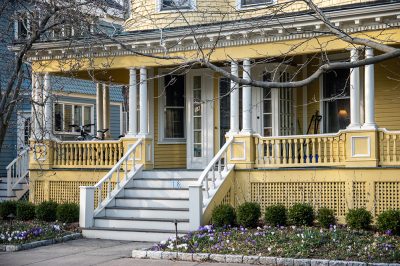Renters and homeowners alike may be getting some relief this fall.

Gov. Charlie Baker extended Tuesday the moratorium on evictions and foreclosures until Oct. 17.
The original moratorium was signed into law on April 20, more than a month after Baker declared a state of emergency in Massachusetts due to COVID-19. The moratorium was originally set to expire Aug. 18.
“I am confident that this action, coupled with federal assistance, helped to slow the spread of COVID-19 ,” Baker wrote in a letter Tuesday to state congressional leaders, “while minimizing the impact to date on vulnerable families and on our housing market.”
The moratorium suspends “nonessential” evictions of both residential and commercial tenants and puts a pause on foreclosures of residential properties, according to the act, providing state residents with housing security.
However, the moratorium does not relieve tenants from paying rent or relieve property-owners from mortgage payments, according to Baker’s extension letter.
“I strongly encourage tenants to continue to pay rent, and homeowners to make their mortgage payments,” Baker wrote, “to the extent they are able while the moratoria remain in place.”
Many landlords have also been hurt financially by the pandemic and the moratorium will likely exacerbate their struggle, Baker wrote.
“I am aware that the extension I am declaring today will impact many small landlords,” Baker wrote, “who rely on rental income to pay their own expenses.”
In order to assist small landlords, low-income households and those financially devastated by COVID-19, the Baker-Polito administration launched the Emergency Rental and Mortgage Assistance program on July 1.
ERMA provided $20 million of funding toward helping Massachusetts residents meet rent and mortgage payments.
Brian Jordan, director of communications at Boston Housing Authority, which provides subsidized housing to low-income residents, wrote in an email that BHA will not have any nonessential evictions, regardless of government aid or the extension of the moratorium.
Nonessential evictions are defined as those unrelated to criminal activity or health and safety risks to BHA residents and employees, according to Boston Housing Authority’s website.
“BHA extended our eviction moratorium for our public housing residents through the end of the year,” Jordan wrote.
Carol Owens, director of strategic engagement and marketing at the Boston Department of Neighborhood Development, wrote in an email that additional programs are in the works to aid Massachusetts residents.
“We are working on assisting homeowners with mortgage deferrals and other forms of financial assistance,” Owens wrote. “For renters, we established the Rental Relief Fund, which is still awarding payments to help renters at risk of losing their housing.”
For now, the extended moratorium serves as a gift of time.
“Our goal is to help stabilize households now, before the moratorium expires,” Owens wrote. “Our focus right now is on working with renters, and landlords to ensure that newly stabilized tenancies remain stable.”
Alexander Sturke, director of communications at DND, wrote in an email that the extension of the moratorium will benefit residents in a multitude of ways.
“The extension will allow people the time and opportunity to apply for funds and apply to programs that can help them get caught up on their rent,” Sturke wrote.
Additionally, the moratorium is a time to settle disputes between tenants and landlords, Sturke wrote.
“Of course, we’re encouraging people to pay their rent if they’re able to do so, and encouraging homeowners and landlords to speak to their lenders,” Sturke wrote. “We’re also available to mediate … and this will give us the time to try and find a solution.”
In terms of the length of the moratorium, Sturke wrote the unprecedented nature of the pandemic makes it impossible to know if the extension is long enough.
“With everything related to this pandemic,” Sturke wrote, “we aren’t able to speculate about what will happen in the future.”














